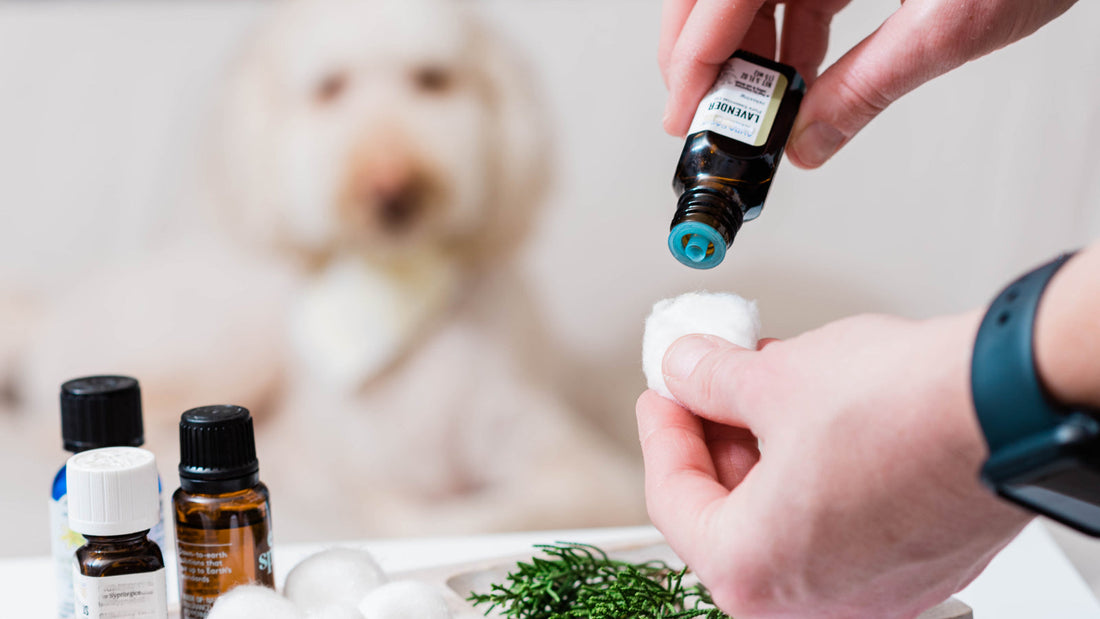Essential oils (EOs for short) are aromatic oils that have been used since the ancient Egyptians starting around 4,500 B.C, as evidence and recorded history have shown. Throughout time, these wonderful oils have been used as fragrance enhancers, as mood boosters, and even for medicinal purposes.
Nature’s magic can be found in essential oils. They’re part of a plant’s natural defense against predators and pathogens. Plants secrete the oils to repel pests and fend off threats they can’t naturally escape because they can’t move – well at least not fast enough. That’s why many EOs have been used in pest control products such as Wondercide. The bonus: Essential oils give our sprays their well-loved scents.
When used as directed there are many potential benefits of using essential oils with dogs. Veterinarians like internationally-recognized holistic vet. Dr. Melissa Shelton are making it easier for pet owners to understand how to use them thoughtfully as well as safely.
What’s the most important thing to know when it comes to using essential oils safely on dogs?
As Dr. Shelton shares, it all starts with making sure you’re using pure, natural essential oils, not synthetic or altered EOs. Dr. Shelton states “Certainly, any essential oil that would be more towards a ‘fragrance-grade’ oil – will have the potential to cause long term problems….In homes with a lot of air freshener and artificial fragrance use, these lesser essential oils are akin to spraying perfume on your [pet] and wondering why that didn’t bode well. And it is just unfortunate in the current market of essential oils that there are so many poor grade essential oils being sold as high quality.”
So are essential oils safe for dogs?
According to experts like Dr. Shelton and Dr. Karen Becker (known as “the most followed vet in the world”), yes! – providing you follow certain safety guidelines which include the following:
- Start with a natural essential oil that’s been tested for purity. Steam-distilled natural essential oils from a trusted company are good. A holistic vet can also help guide you to the right medial-grade, pet-worthy oils.
- Ensure the oil you use is used as directed (e.g. properly diluted and applied) and only for the uses advised. Diffusing may not be advised for all oils for instance and if you also have reptiles or small mammals in your household, some oils shouldn’t be diffused.
- Consult a veterinarian trained in essential oil use for guidance and reassurance. A functional or holistic vet is often well versed in the use of medical grade essential oils with pets.
This chat with doctors Sheton and Becker highlights some important points about using essential oils with dogs. They touch on physical and emotional benefits that include supporting healing, improving wellness, and aromatherapeutic uses like calming anxiety or boosting happiness.
Still, the use of essential oils with dogs and other pets comes with some controversy in the medical community and there is a good deal of misinformation shared in online resources as well social media – often repeated over and over until the misperception becomes the prevailing sentiment. Good resources to start or continue your education include The Animal Desk Reference: Essential Oils for Animals and the animalEO website.
What are the different ways EOs are used with dogs?
When the proper precautions and guidelines are followed, essential oils have been successfully used with dogs in diffusers, in drinking water, and applied topically such as in properly diluted sprays. Always follow the use guidelines from a trusted source and never try to do it without expert knowledge. Our furry ones deserve our protection when it comes to introducing any new product and using essential oils.

Essential oils for dogs
Dr. Janet Roark, the essential oil vet, highlights several EOs that she loves for dogs and we’ve added a few others experts suggest to compile this list of 8 essential oils for dogs. There are many more oils that have been used with dogs for their potential health and wellness benefits, including essential oils distilled from fennel, spearmint, myrrh, neem, helichrysum.
Work with your vet trained in essential use to ensure safety for you and your pet.
1. Lavender Oil for Dogs
Lavender essential oil is steam distilled from the flowers of the lavender plant. It is widely known for its calming properties.
Holistic veterinarians like Dr. Roark have used lavender oil to treat anxious or stressed animals. She shares “Lavender essential oil can be used for all things calming. Whether your animal is anxious or has stress in their lives, is fearful of loud noises, or gets very excited when company visits, lavender may be helpful. It helps relax muscles that are tense and soothes skin that is irritated or damaged. It is emotionally used to help calm insecurities, fear, tension, and blockages. This oil is excellent to use in transitions such as bringing a new puppy home that may miss their mother…or if you are moving to a new home or apartment.”
When used as directed and in certain solutions, Lavender essential oil has also been used to soothe irritated, itchy skin or skin with inflammation like hot spots. The pleasant aroma of lavender oil makes it a great deodorizer for dogs too.
Looking for dog products with lavender oil? Wondercide’s Skin Tonic spray and Skin Tonic oil are two faves that are designed to provide soothing relief for dry, itchy, irritated skin, sun burns, hot spots, and other skin issues.
2. Frankincense Oil for Dogs
Frankincense oil is steam distilled from the resin of the frankincense tree. The resin comes from the tree’s trunk and is a hardened form of the sap. This oil promotes feelings of peace and relaxation in dogs. It’s been used in many aspects of pet care because it is known to promote cellular health and overall wellness. Dr. Roark shares that Frankincense oil can be paired with lavender oil to help soothe irritated skin.
3. Peppermint Oil for Dogs
Peppermint essential oil is made from the whole peppermint plant The oil is high in menthol which gives it cooling and refreshing properties. Peppermint oil lends an energizing effect and provides a needed pick-me-up. When used in some types of applications, it’s also known to help relieve sore muscles or aching joints so it’s a natural choice for active animals post activity or older dogs.
Peppermint essential oil is featured in this peppermint-scented line up that works against fleas, ticks, and mosquitos: scented flea, tick, and mosquito spray, shampoo, collar, and spot on for dogs
4. Cedarwood Oil for Dogs
Cedarwood essential oil is made from the bark, trunk, and branches of cedar trees. It’s the top EO in Wondercide’s Flea & Tick solutions for dogs (shampoo, spot on, collar, pet and home spray, and yard spray) because it helps kill and repel select bugs that can bother our furry ones. One of the benefits of our steam distilled cedarwood oil is that we don't use the parts of the tree with pollen. So for those who suffer from allergies known here as Cedar Fever, that’s good news.
5. Lemongrass Oil for Dogs
Lemongrass essential oil is made from the leaves of this plant. It’s a popular essential oil used in products for both people and pets, and it’s most known for its sweet citrus scent. It is commonly used as an effective natural insect repellent and when used in certain types of applications has been noted as having anti-inflammatory properties that may help with arthritis or joint issues.
Love lemongrass? It’s in the most popular scent of this flea-and-tick spray for dogs designed to kill, repel, and prevent fleas, ticks, and mosquitoes.
6. Rosemary Oil for Dogs
Rosemary essential oil is extracted from the leaves and branches of a rosemary shrub. Often used to promote healthy coats and soothe irritated skin, rosemary essential oil is also frequently used as a natural flea and tick repellant. That’s why it’s in Rosemary Flea & Tick spray for dogs.
7. Cardamom Oil for Dogs
Cardamom essential oil is steam distilled from the seeds of Elettaria Cardamomum, a plant that’s a member of the ginger family. The EO is cited as helping to reduce nausea or settle the stomach, treat coughs, support overall respiratory function, and regulate appetite.
8. Citronella Oil for Dogs
Citronella essential oil is another insect-repelling essential oil known for its ability to deter fleas and ticks. It’s made from the grass of the plant. Citronella oil is available in a wide variety of products including sprays, candles, wipes, and shampoos. It has a lemony scent that many people find refreshing, which is why it’s also sometimes used in cleaning products or to cover up unwanted odors.
While not designed for or tested as a pest control product, if you like the idea of citronella for your dog, you can find it in our Geranium shampoo bar with citronella.
What Essential Oils Are Bad for Dogs?
Any poor quality oil not used properly isn’t safe for dogs. And any dog can be sensitive to any essential oil or blend. As is most often the case, the allergy or sensitivity isn’t known until your dog is exposed to the ingredient so it’s always important to spot test and go slow when introducing any new product to the one you love.
Age also matters with some EOs and it’s sometimes the case that older dogs can use an essential oil but it’s not recommended for puppies. In fact, there’s an almost 600–page book written by Dr. Shelton that covers essential oil safety for animals. That’s why when it comes to safety, it’s recommended you work with an EO expert or use products that were formulated by experts.
The following essential oils are often on the list of oils not to use with dogs. Research and caution is recommended. Consult with your vet to confirm these oils are a no-go for your doggo.
How to Use Essential Oils for Dogs

Diffusing essential oils around dogs
Using essential oils on dogs topically
| Product | Featuring |
| Flea & Tick Pets + Home sprays | Cedarwood, Lemongrass, Rosemary, Peppermint |
| Flea & Tick Shampoo | Cedarwood, Peppermint |
| Flea & Tick Spot On | Cedarwood, Peppermint |
| Flea & Tick Collar | Cedarwood, Peppermint |
| Skin Tonic Spray and Skin Tonic Oil | Cedarwood, Lemongrass, Lavendar |
| Geranium Shampoo Bar | Geranium, Citronella |
| Exfoliating Shampoo Bar | Patchouli |




